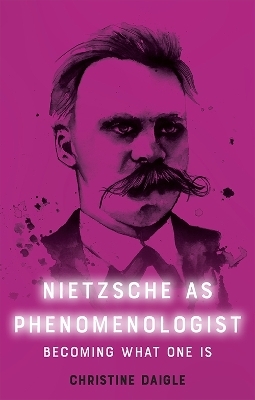
Nietzsche as Phenomenologist
Seiten
2023
Edinburgh University Press (Verlag)
978-1-4744-8785-6 (ISBN)
Edinburgh University Press (Verlag)
978-1-4744-8785-6 (ISBN)
Radically revises Nietzsche's ethical and political views by controversially interpreting his philosophy as phenomenological.
Radically revises Nietzsche's ethical and political views by controversially interpreting his philosophy as phenomenological
Closely analyses the often-disregarded middle period works by Nietzsche, including The Gay Science, Daybreak and Human, All Too Human
Includes a new interpretation of key concepts, such as will to power, to emphasise their phenomenological import
Engages with prominent commentators from the continental and analytic tradition including Ruth Abbey, Keith Ansell-Pearson, Rebecca Bamford, Christa Davis Acampora, and Robert C. Miner
Advances new perspectives on central and well-known passages from Nietzsche's corpus
Christine Daigle explores Nietzsche's phenomenological method, a 'wild phenomenology', to elucidate his understanding of the human being as an intentional embodied consciousness, as a being-in-the-world and as a being-with-others. Establishing this phenomenological conception of the human allows Daigle to revisit the Nietzschean notions of free spirit and the Overhuman and how they express the ethical and cultural-political flourishing Nietzsche envisions for human beings.
This daring reinterpretation of Nietzsche's philosophy resolves inconsistencies in previous scholarship and offers a thought-provoking new take on his ethical and political views.
Radically revises Nietzsche's ethical and political views by controversially interpreting his philosophy as phenomenological
Closely analyses the often-disregarded middle period works by Nietzsche, including The Gay Science, Daybreak and Human, All Too Human
Includes a new interpretation of key concepts, such as will to power, to emphasise their phenomenological import
Engages with prominent commentators from the continental and analytic tradition including Ruth Abbey, Keith Ansell-Pearson, Rebecca Bamford, Christa Davis Acampora, and Robert C. Miner
Advances new perspectives on central and well-known passages from Nietzsche's corpus
Christine Daigle explores Nietzsche's phenomenological method, a 'wild phenomenology', to elucidate his understanding of the human being as an intentional embodied consciousness, as a being-in-the-world and as a being-with-others. Establishing this phenomenological conception of the human allows Daigle to revisit the Nietzschean notions of free spirit and the Overhuman and how they express the ethical and cultural-political flourishing Nietzsche envisions for human beings.
This daring reinterpretation of Nietzsche's philosophy resolves inconsistencies in previous scholarship and offers a thought-provoking new take on his ethical and political views.
Christine Daigle is Professor of Philosophy and Director of the Posthumanism Research Institute at Brock University, Canada. She is the author of Jean-Paul Sartre (Routledge, Critical Thinkers Series, 2009), co-editor of Nietzsche and Phenomenology: Power, Life, Subjectivity (Indiana University Press, 2013) and Beauvoir and Sartre: The Riddle of Influence (Indiana University Press, 2009). She is editor of Existentialist Thinkers and Ethics (McGill/Queen's University Press, 2006) and author of Le Nihilisme est-il un humanisme? tude sur Nietzsche et Sartre (Presses de l'Universit Laval, 2005). She has also authored and co-authored many articles on Nietzsche, Sartre, Beauvoir, posthumanism and environmental (post)humanities.
| Erscheinungsdatum | 02.05.2023 |
|---|---|
| Verlagsort | Edinburgh |
| Sprache | englisch |
| Maße | 138 x 216 mm |
| Themenwelt | Geisteswissenschaften ► Philosophie ► Ethik |
| Sozialwissenschaften | |
| ISBN-10 | 1-4744-8785-8 / 1474487858 |
| ISBN-13 | 978-1-4744-8785-6 / 9781474487856 |
| Zustand | Neuware |
| Informationen gemäß Produktsicherheitsverordnung (GPSR) | |
| Haben Sie eine Frage zum Produkt? |
Mehr entdecken
aus dem Bereich
aus dem Bereich


